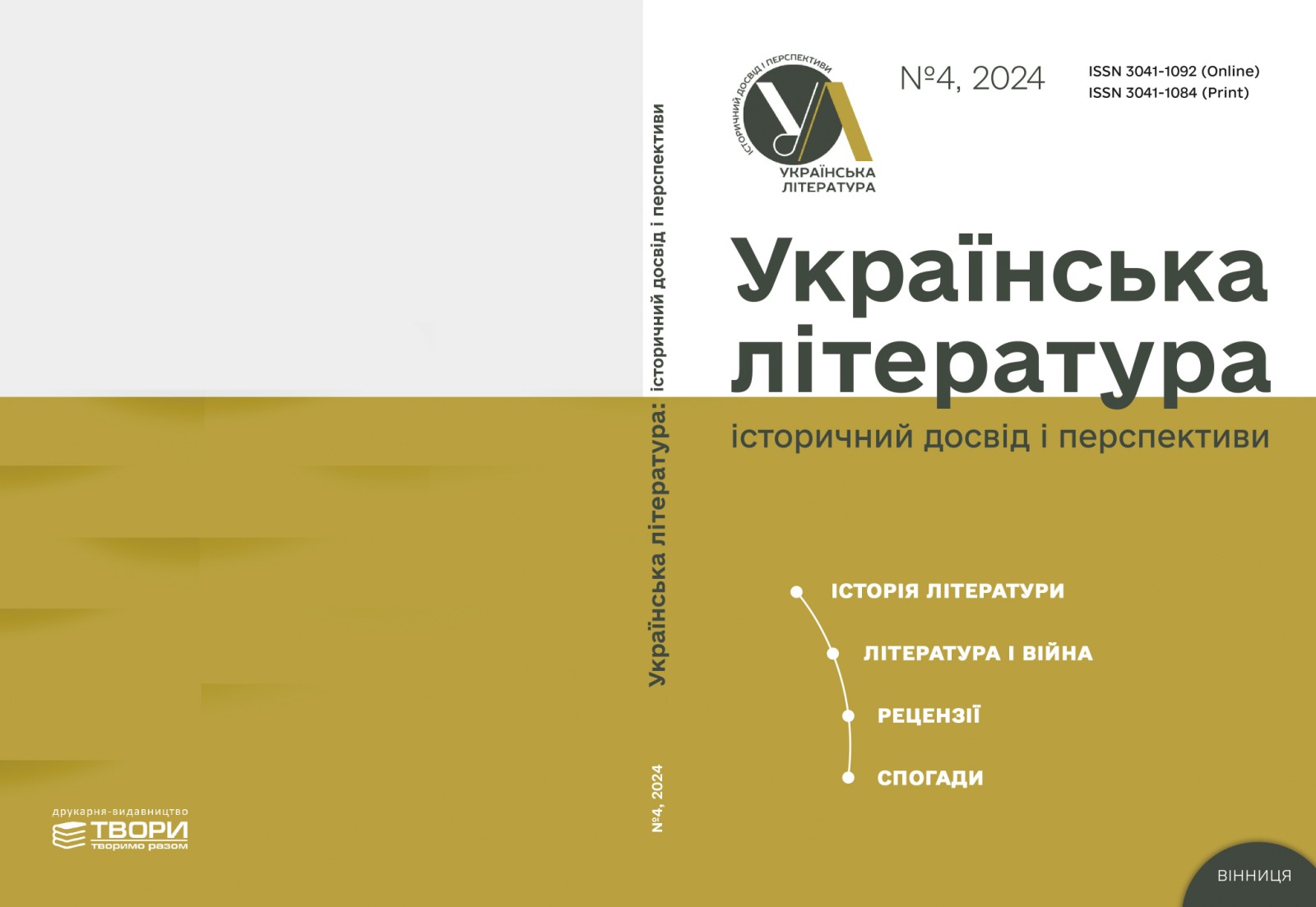Peculiarities of Psychologism in Ivan Korsak's Fiction and Documentary Short Prose
https://doi.org/10.31652/3041-1084-2024-4-07Published 2024-12-31
Keywords
- Ivan Korsak, short prose, short stories, psychologism, literature, historical themes, journalism
Copyright (c) 2024 Віктор Павлович Яручик

This work is licensed under a Creative Commons Attribution 4.0 International License.
How to Cite
Abstract
Ivan Korsak's works include novels, novellas, and short stories about significant historical figures. His writings have been translated into Lithuanian, Polish, English, and Turkish. The life situations and characters from Korsak's first book “Shadows and Glimmers” are perceived as entirely realistic, almost as if “written off” (in the best sense of the word) from our lives.
In the first period of his creative career, Korsak’s short prose plays a particularly important role. While based on real-life events, his works do not aim to simply depict reality for its own sake. Drawing from the variety of everyday life in the district center, he selects the most characteristic situations that provoke reflection and encourage evaluation of human actions from the perspectives of righteousness, integrity, and adherence to moral principles.
The story about life in the village during the stagnation period, descriptions of bureaucratic life, the levelling of human values, injustice, meanness, deceit, and betrayal form the core of his works. In contrast to these negative aspects of society, the author contrasts what is most important: goodness, faith in a better reality, the power of noble feelings, love, beauty, optimism, etc.
A key feature of Korsak’s literary talent is his inclination toward psychological depth and his exploration of characters’ inner worlds. Thanks to this, he creates vivid and convincing portraits, such as that of the nature-sensitive forester Petro (“Bambor”), the morally degraded former head of the collective farm («Chairman»), the vile Pylyp Kalistratovych (“Extraordinary Inspector”), and the contradictory in his views and actions Anatolii Oleksiiovych (Slander).
Korsak’s stories are simple in form, engaging in content, rich with authentic folk speech, and sure to capture the reader's attention.
Downloads
References
- Бєлова Г. Іван Корсак – журналіст, політик, бізнесмен… інтелігент. Волинська газета, 2006. 14 вересня. С. 4.
- Вербич В. Благословення Волинню : переможець – Михайло (Міхал) Чайковський : принагідні думки та асоціації після першого прочитання роману Івана Корсака «Отаман Чайка». Світязь : альманах Волинської обласної організації Національної спілки письменників України, 2010. Випуск 16. С. 113–131.
- Вербич. В. Жити в імені України та Польщі. Луцьк : ПВД «Твердиня», 2011. 290 с.
- Галич О. Ганна Барвінок у біографічному просторі. Вісник Маріупольського державного університету. Серія : Філологія : збірник наукових праць. Маріуполь : Маріупольський державний університет, 2015. Випуск 13. С. 14–21.
- Заєць В. Висока планка Івана Корсака. Культура і життя. 2009. 26 серп. С. 9.
- Клімчук Л. Для Івана Корсака кожен історичний факт – на вагу золота. Луцький замок, 2011. 130 с.
- Козак С. «Тиха правда» Модеста Левицького. Літературна Україна, 2009. 2 липня. С. 1.
- Корсак І. Завойовник Європи : уривок з однойменного роману. Літературна Україна, 2011. 190 с.
- Корсак Іван – прозаїк, публіцист, член НСПУ з 1992 р. Волинь : Ін-т біогр. досліджень, Укр. Наук. т-во геральдики і лексикології, 2006. 261 с.
- Мізінкіна О. Фольклорні жанри в художньому світі роману І. Корсака «Завойовник Європи». Література в контексті культури, 2015. Випуск 26. С. 231–238.
- Ніколенко О. Теорія та історія роману. Роман у літературі ХІХ століття. Лекція 5 [Текст]. Всесвітня література в середніх навчальних закладах України. 2007. № 1. С. 22–26.





